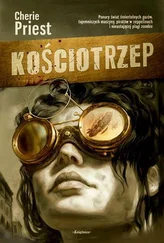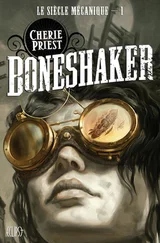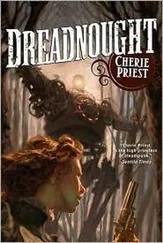No, ridiculous would’ve been hoping for the architect to note the entrance in pencil before filing the work order away.
Maria praised God for ridiculous men.
She examined the vat, running her hands along its rough contours, its rivets, bands, and bolts. To one side she saw a scuff on the floor that gave a hint in which direction it may have been moved. She got a good grip and leaned against it with her shoulder and thigh. It moved aside with only the faintest scrape, much more easily and quietly than she would’ve expected.
And descending below the vat, she discovered a narrow set of stairs. At their bottom a dim light glowed, from a source that was either feeble or quite far away. She readied her gun again and put Croggon Hainey’s gift inside her skirt pocket. It barely fit, but it nestled against her leg in a comforting fashion. In a way, it was more comforting than the gun.
Down the steps she went, slowly and carefully, letting her eyes adjust to the lessened light. It was the color of muddy water, and it showed her mostly shapes and angles, but little detail. She had an electric torch in her bag, but such things were hot and unreliable, and would only call attention to her presence.
And she didn’t need it yet.
She’d committed the schematics to memory, so she knew where she was. Under the old storage room floor. Proceeding toward an open area beneath the center of the factory, partitioned off into sealed rooms that locked from the outside.
She passed a huge door that looked ready to be shut in case of emergency, capping off the entire wing and trapping any threat in place. The sort of thing that might be a safeguard against fire, though Maria knew better than to think that the door—or doors, for here was another one—were installed to save the building or protect its inhabitants. These doors were a safeguard against the weapons themselves, the very products that were being developed in the cavernous, secret place below.
She heard a weird, unsettling buzz from down there, no louder than a whisper. A faint, mechanical drone on a frequency so low that her ears could barely detect it. The timbre made her shudder; it sent shivers up and down her arms, though the underground level was almost too warm for her preference.
A clatter. A shuffling thump.
Maria held very still and listened. It came again, uneven and slow, the stuttering motion of something mindless that wanders.
The corridor ended in a T, offering her the option of proceeding left or right. Left would lead to a series of chambers that might be offices. Right would send her to an open area without cover, an unmarked space that looked to be a testing center.
Maria went left.
The hazy murk of light grew stronger, and soon she knew why: along one side of the hall, there was a series of doors with small, square windows fixed at face height. The rooms were lit from within, and what spilled out into the corridor gave plenty of illumination, none of it reassuring.
The dull thumping sound grew louder; it came from the second door. She stood on tiptoe to peek inside, and at first she saw nothing—only a yellowish fog too thick to scry. The fog wavered, swirled, and settled, disturbed by the movement of something ponderous and grim. She finally spied a shape at the far end of the smallish room: a figure like a man, but it didn’t move like anything human, like anything alive.
Transfixed, Maria watched as it ambled and roamed, stumbling forward, toppling back, but never falling. Always catching itself, as if the last systems still working were the ones that kept it upright.
Then it saw her.
It pivoted, almost smoothly—and without a pause, without a hesitation of recognition, without any mindful awareness, it ran toward the door. If it knew anything, it knew only that Maria was on the other side of it, and that she was alive.
And it knew that it was hungry.
It slammed against the wood, flinging itself again and again at the barrier, as if by pure persistence it might bash its way through.
Maria recoiled in horror. When she was confident that the thing could not reach her, she stepped back to the window and forced herself to watch it. She took it all in: the smashed, bloody face with yellowed skin; those bulbous, jellylike eyes that made no true contact with her own—no understanding, no moment of knowing. The creature was naked. Its skin was loose and sagging; here and there, it split like an overripe tomato, revealing grayish tissue and oozing gelatinous pus.
The thing was lifeless, and yet it lived.
She shuddered, gagged, and turned around, closing her eyes and opening them again, wanting to wipe the image away. But in the next room was another shambling ruin of skin and bones; and in the next room down, another pair of them.
Her stomach lurched, and lurched again as she proceeded, and the dim, golden light took on a weird, offensive odor halfway between sour well water and a sun-bloated corpse.
She hugged the far wall as she walked, confident that the doors were secure, but still wanting as much distance from them as she could muster. She hurried along, knowing that the hall opened up before long—and it did, and then there was more light, and another emergency door.
Maria leaned against this door as she paused to catch her breath. She noticed that it was treated with some waxy or rubbery substance, and around its edges were flaps to complete the seal.
A big picture formed in her mind. It was horrific.
On the other side of the fire door and at the end of a corridor was a room that looked like a laboratory. When Maria found a way inside, her suspicion was confirmed. It was filled with recording equipment—advanced cameras and electrical printing devices not altogether unlike the one attached to the Fiddlehead, which Gideon Bardsley had been kind enough to show her before she’d left the District. Freshly restored and churning out its facts and figures, the machine was a marvel once more. Now it occupied a new position on the first floor of the Jefferson building—in a jumbled room full of fumes and noise, papers and equipment.
But this room was white and clean, and so was everything inside it. This was an observation room, designed to observe in a clinical fashion whatever occurred in that central space.
From what felt like a place of relative safety, Maria looked outside the laboratory and observed vents near the ceiling, connected to a system of fans, tubes, and unmarked tanks. She noted a collection of detritus in a corner that might’ve been a pile of bones, or might’ve only been trash. Dark stains spread across the floor. She did her best to imagine that they were oil, grease, dyes, or anything other than the most likely fluid, though the stain drooled in runny streaks toward a drain in the center of the room.
While she watched, a light came on, revealing that yes, the stain was an incriminating shade of brownish red.
This light had all the cold brilliance of a surgical lamp. She briefly winced against it, but there was no time to close her eyes. Along with the light came the sound of footsteps—the determined, hasty sort of someone who had someplace to be. It was not the pace of a dead thing, but that didn’t mean it was friendly.
Maria went to the observation room door and shut it. She was relieved to see that it locked from within, unlike the cells she’d passed before. She was furthermore glad to observe that it was sealed like the emergency door, for the safety of its occupants.
She returned to the window just in time to see Katharine Haymes arrive, stop, and stand beneath the brilliant overhead light. Their eyes met through the glass, and locked.
Haymes carried a carpetbag and was dressed for travel, in a smart brown suit and gloves. The bag was unfastened, as if there was one more thing she needed to stuff inside it before she was on her way. One last item she simply couldn’t leave without.
Читать дальше










